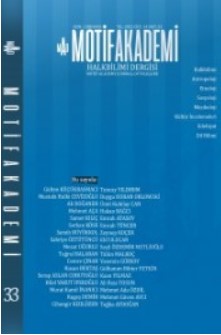DERT SÖZÜNÜN KÖKENİ
THE ORIGIN OF THE WORD DERT
Author(s): Cihangir KizilözenSubject(s): Cultural history, Oral history, Historical Linguistics, Comparative Linguistics, Turkic languages
Published by: Motif Halk Oyunları Eğitim ve Öğretim Vakfı
Keywords: Dert; tark; tarak; Old The Old Uyghur Language; The Book of Dede Korkut; Turkish and Persian relationship;
Summary/Abstract: Researchers read a word as “firāḳ” in the Book of Dede Korkut in the Dresden manuscript. But the first letter of the word in question was written “ ت” to be pronounced, not “ ”. So the word should be pronounced as “taraḳ”, not “firaḳ”. And there is also a problem about the word to make sense of it. Researchers gave the meaning of “the pain of separation” to the word they read as “firak”. But the word “firak” is not rendered as “the pain of separation” in any sources. An Arabic word “firāḳ (< ferāḳ)” has been used in the sense of “separation” in all sources. This examination asserts that the word should be read as “taraḳ”, not “firaḳ”. In the Book of Dede Korkut, Turkis words with back vowel beginning with “ ت” are written with “ ط ”. However, this word, although with back vowel, is written with ” ت ”. In this study, it has been examined why the word “taraḳ” with back vowel is written with ” ت”. According to this explanation, the samples written with ” ت” although they are with back vowel, are Turkish words that are seen in Persian sources. So a cognate of the word “taraḳ” written with ” ت ” should also exist in Persian sources. This article focuses on the possibility that Turkish word “tarāḳ” and Persian word “dert” are cognates and both of them come from the same Turkish root “tar”/ “dar”. And especially the sound and meaning relationship between Old Turkish “tark” (grievance) and Middle Persian “dert” (grievance) that are thought to be cognates with “tarak”, have adequate evidence to prove that they are cognates.
Journal: Motif Akademi Halkbilimi Dergisi
- Issue Year: 14/2021
- Issue No: 33
- Page Range: 389-404
- Page Count: 12
- Language: Turkish

